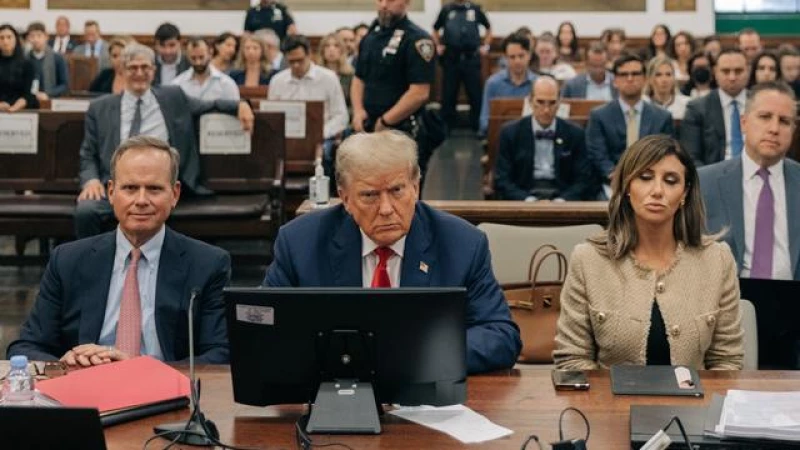A spokesperson for New York Attorney General Letitia James pushed back against former President Donald Trump's assertion that he is unable to secure the more than $460 million required to post bond and appeal the civil fraud ruling against him. The spokesperson argued in a filing that the court should reject Trump's "extraordinary request" to appeal without providing the full amount.
Trump's legal team had informed the court earlier this week that it would be a "practical impossibility" for him and the other defendants to obtain the bond by March 25.
In response on Wednesday, Dennis Fan, a senior assistant solicitor general for the state, criticized Trump's filing as "procedurally improper" and recommended that the court dismiss it. Fan stated that Trump's concerns should have been raised in a previous filing, noting that efforts to secure the bond were initiated before the motion for a stay was submitted and even before the judgment was finalized.
In a ruling made in February, a judge in New York mandated that Trump and his co-defendants must pay over $450 million in penalties and interest for engaging in a fraudulent scheme that spanned a decade. This penalty stands as one of the most substantial corporate sanctions in the history of New York. To proceed with his appeal, Trump is required to secure a bond for the entire judgment amount, which continues to accumulate interest. The state's attorney general has stated that if Trump fails to produce the necessary funds, certain assets will be seized by the state.
Fan, in a brief statement, also discredited many of the assertions made by Trump, clarifying that it is not obligatory to secure a bond from a single underwriter for the complete amount, but rather multiple sureties can be combined to cover the total sum.
"The argument put forth by the defendants that obtaining a full bond is unattainable is predicated on the erroneous assumption that they must acquire a single bond from a sole surety for the entire judgment sum of $464 million," Fan stated. "However, parties appealing a judgment can bond large amounts by distributing the bond value among multiple sureties, thereby reducing the risk to individual sureties to a smaller amount, such as $100 or $200 million each."
Fan raised concerns as to why potential backers have declined to accept Trump's real estate assets as collateral, hinting that this refusal could be due to the fraudulent overvaluation of these properties.
"From the Court's perspective, it appears that sureties may have rejected the defendants' specific assets as collateral because the valuation of Mr. Trump's real estate necessitates 'a property appraisal,' and the worth of his holdings is not as substantial as claimed by the defendants," Fan explained.
An attorney for Trump did not reply to a request for comment. Trump, the presumptive Republican nominee for president, has harshly criticized James' investigation for years, calling himself the victim of a political persecution by a Democrat. James' office uncovered a scheme in which Trump and his company used falsified real estate and net worth valuations to obtain loan and insurance terms that a judge found led to hundreds of millions in "ill-gotten gains."
Fan also criticized two letters submitted along with Trump's Monday filing, the first from insurance broker Gary Giulietti. Fan pointed out that Giulietti testified during the fraud trial and was later criticized by the judge.
"Gary Giulietti does not disclose that he was an expert witness for defendants at trial or that [New York Judge Arthur Engoron] found Mr. Giulietti's trial testimony to lack credibility," Fan wrote, referring to the judge who oversaw the trial. "As the court explained, Mr. Giulietti 'has an ongoing personal and professional relationship with Donald Trump.'
Giulietti, president of private insurance firm Lockton Companies, wrote that he believes it "is not possible under the circumstances presented" for the defendants to secure a bond.
Fan also criticized a letter from Trump Organization general counsel Alan Garten, who said the company approached more than 30 surety companies. According to Garten, most did not have the "financial strength" to support such a large bond, and the "vast majority" of those that did were "unwilling to accept the risk associated with such a large bond."
Fan urged the appeals court to disregard Garten's claims.
"Engoron's Feb. 16 ruling stated that he was directly involved in the deceitful and unlawful actions that led to the verdict in this instance," Fan stated, referencing the judgment that was issued.







